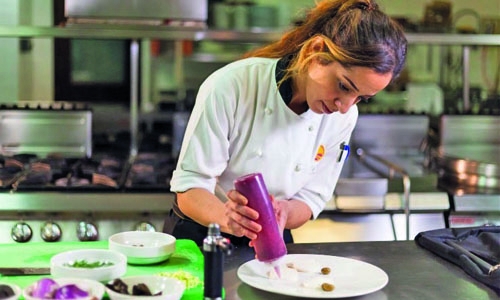Food for thought
Manama : India and Bahrain have had a very strong relationship for many years now. It can be seen in many sectors of the society and one such sector is food. Indian and Bahraini cuisines have lots of similarities.
“Through the trade of the Silk Route, and with Bahrain, being in a strategic geographical location, the spice trade gave us cinnamon, nutmeg, pepper, ginger, and cloves. These are all predominant flavours that we use in our local dishes and cuisine. You can also see the heavy influence that Indian cuisine has had on Bahraini palettes! whether it’s Biryani, which we have adapted our own version, or curry which we call “Saloona”, or the fact that chilli and spicy food is widely accepted in Bahrain. Rice is a staple in both cuisines, as is “Khubiz” or Naan bread, as well as spiced and spicy food. The parallels are hard to miss,” says Tala Bashmi, a chef from Fusions Restaurant, Gulf Hotel.
The food from a place represents its culture, a culture that could be transmitted from one person to another.
”Food and the way we eat is defined by several factors including, weather, level of vegetation, and the overall type of work in area. As back in the day Bahrainis work was more labour intensive, the traditional local dishes tend to be heavier such as Bacha, Mathrooba, and Thireed, which are dishes high in protein, carbohydrates, and fats. However, as the times have changed, jobs and people on the island have become more sedentary, traditional dishes are served at special occasions. Local tastes cuisine has been developed through traditions and cultures of an area, so I believe that cuisine is a cultural construct, and is highly visible when comparing two completely different cultures,” says Tala.
Though the Gulf Hotel has a wide verity of dishes, there are few dishes that have been the all-time favourites like the Prawns Machboos, or Ghoozi, Bahraini Tikka and the Kubideh kebab. The restaurant has also prepared a special menu for this year’s Ramadan. ” Our menu highlights are our best dishes and we are known for excelling at traditional food. Classics such as Ghoozi, Harees, Thireed, Ghormeh Sabzi, and Machboos are to name a few. We will also have interactive live stations including shawarma, tikka, kebab, Manakeesh, Argentinian Grills, Japanese Teppanyaki, and fresh local bread,” says Tala.
“We are including many international options from the Japanese we have sushi and maki, Chinese stir fried dishes, Italian pastas, and our newest addition is our healthy corner which includes sugar-free, low fat, and organic options for those who are looking to have lighter and more health conscious meals for iftar,” added Tala.
Related Posts

